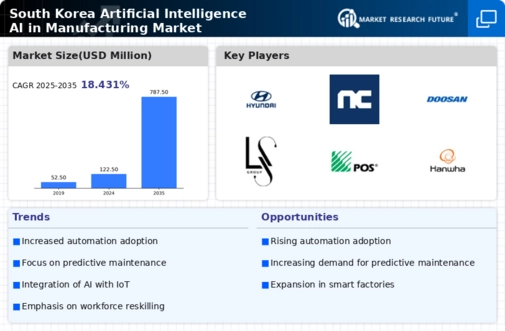Rising Labor Costs
Rising labor costs are compelling manufacturers to explore AI solutions, thereby driving the Global South Korea Artificial Intelligence AI in Manufacturing Market Industry. As wages continue to increase, companies are incentivized to invest in AI technologies that can automate repetitive tasks and enhance operational efficiency. For instance, AI systems can optimize supply chain management and inventory control, leading to reduced operational costs. This shift towards AI adoption is likely to accelerate market growth, as manufacturers seek to maintain competitiveness in an evolving economic landscape.
Government Initiatives
Government initiatives play a crucial role in fostering the Global South Korea Artificial Intelligence AI in Manufacturing Market Industry. The South Korean government has launched various programs aimed at promoting AI adoption in manufacturing sectors. These initiatives include funding for research and development, tax incentives for companies investing in AI technologies, and the establishment of innovation hubs. Such support is likely to stimulate market growth, with projections indicating a market size of 12.5 USD Billion by 2035. This proactive approach underscores the government's commitment to positioning South Korea as a leader in AI-driven manufacturing.
Market Growth Projections
The Global South Korea Artificial Intelligence AI in Manufacturing Market Industry is characterized by robust growth projections. With an anticipated market size of 3.5 USD Billion in 2024, the industry is set to expand significantly over the next decade. The forecasted CAGR of 12.27% from 2025 to 2035 indicates a strong upward trajectory, reflecting the increasing adoption of AI technologies across various manufacturing sectors. This growth is likely to be driven by factors such as technological advancements, government support, and rising demand for automation.
Technological Advancements
The Global South Korea Artificial Intelligence AI in Manufacturing Market Industry is propelled by rapid technological advancements. Innovations in machine learning, computer vision, and robotics are transforming traditional manufacturing processes. For instance, companies are increasingly adopting AI-driven predictive maintenance systems, which can reduce downtime by up to 30%. This shift not only enhances operational efficiency but also leads to significant cost savings. As a result, the market is projected to reach 3.5 USD Billion in 2024, reflecting the growing integration of AI technologies in manufacturing operations.
Global Competitive Pressure
The Global South Korea Artificial Intelligence AI in Manufacturing Market Industry is influenced by competitive pressures from global markets. South Korean manufacturers are increasingly facing competition from countries that are rapidly adopting AI technologies. To maintain their competitive edge, companies are investing in AI-driven innovations that enhance product quality and reduce time-to-market. This competitive landscape is expected to drive significant investments in AI solutions, further propelling the market towards its projected growth of 12.5 USD Billion by 2035.
Increased Demand for Automation
The demand for automation in manufacturing is a significant driver of the Global South Korea Artificial Intelligence AI in Manufacturing Market Industry. As industries seek to enhance productivity and reduce labor costs, AI technologies are increasingly being integrated into manufacturing processes. For example, AI-powered robots are being utilized for assembly lines, resulting in higher precision and efficiency. This trend is expected to contribute to a compound annual growth rate (CAGR) of 12.27% from 2025 to 2035, indicating a robust growth trajectory for the market as automation becomes a standard practice.
















